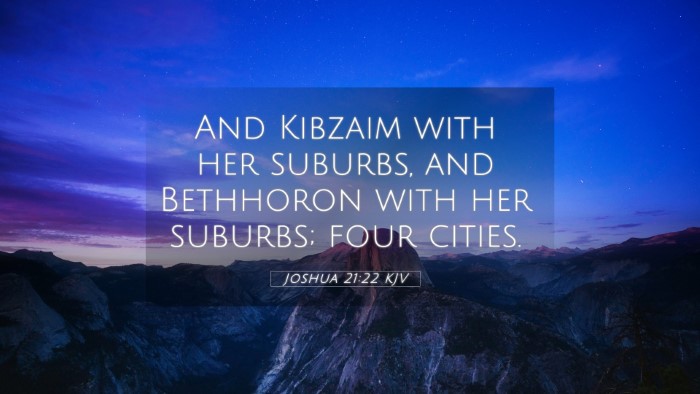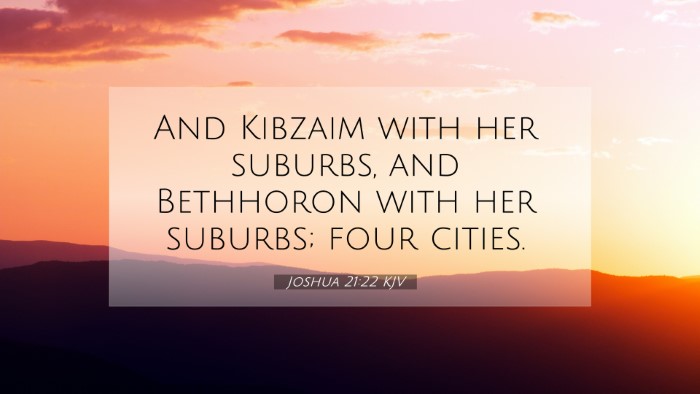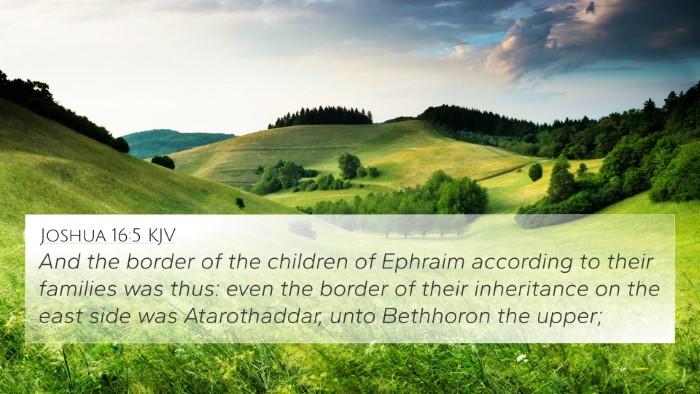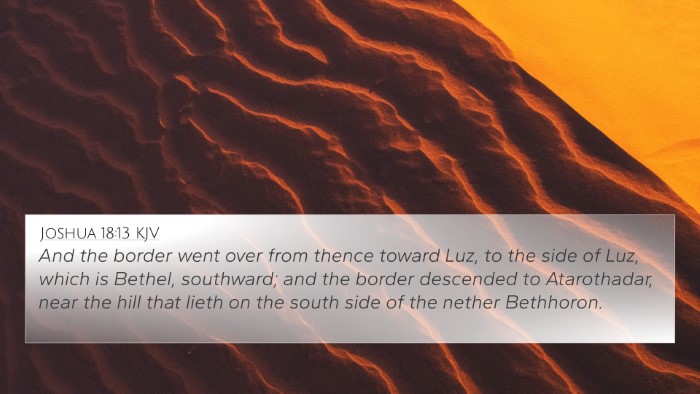Meaning and Interpretation of Joshua 21:22
Joshua 21:22 states: "And Kibzaim, and the city of Naphtali; and the cities of the other tribe of the Gadites were given." This verse reflects the distribution of cities designated for the Levites across various tribes, illustrating God's provision and fulfillment of His promises to His people.
Contextual Insights
This verse falls within the larger narrative of the allocation of land among the tribes of Israel. According to public domain commentaries, such as those from Matthew Henry, Albert Barnes, and Adam Clarke, the cities mentioned represent areas where the Levites would dwell, serving both spiritual and practical roles in Israelite society.
Key Themes
- Divine Provision: The allocation of cities emphasizes God's faithfulness in providing for the Levites, who did not receive a traditional inheritance.
- Community and Service: Levites were designated to serve the spiritual needs of the people, reinforcing the idea that some are called to serve in specific roles within the covenant community.
Commentary Highlights
Matthew Henry: He emphasizes that the Levites were given cities as a way to sustain them and that those cities served as centers for worship, reinforcing the connection between community living and religious life.
Albert Barnes: Barnes notes the importance of Kibzaim in providing a place for Levites where they could fulfill their duties, linking the well-being of the community to the spiritual health nurtured by the Levites.
Adam Clarke: Clarke highlights the assurance that God’s provisions are not only for the present but were also tied to His eternal covenant with Israel, encouraging believers to trust in God's ongoing care.
Cross-References
To better understand Joshua 21:22, it's enlightening to consider the following related scriptures:
- Numbers 35:2-8: Discusses the cities of refuge and the allocations for the Levites.
- Leviticus 25:32-34: Addresses the role of Levites in relation to land ownership and their reliance on divine provision.
- Deuteronomy 10:9: Explains the Levites' inheritance, emphasizing their unique status among the tribes of Israel.
- 1 Chronicles 6:54-81: Provides genealogical context and the assignment of cities to the Levites.
- Joshua 13:14: Details the inheritance given to the tribe of Gad, linking it to Levite cities.
- Hebrews 7:13-14: Discusses the priestly order and its implications for the New Covenant community.
- Matthew 23:11: Jesus refers to the greatest among His followers as servants, relating to the Levites' role.
Connecting Themes and Verses
The interconnections between Joshua 21:22 and other biblical texts highlight themes such as God’s covenantal faithfulness, the role of spiritual leaders, and the service of God within communal life. This verse encapsulates the essence of the Levites' ministry while also informing readers about God's overarching plan for His people.
Thematic Bible Verse Connections
This analysis of Joshua 21:22 helps illustrate the rich tapestry of scripture and encourages believers to explore Bible verses that relate to each other. By engaging in comparative Bible verse analysis, one can uncover deeper insights about divine provision, community responsibilities, and the nature of God's faithfulness.
Tools for Bible Cross-Referencing
Utilizing tools for Bible cross-referencing can enhance your study experience:
- Bible Concordance: A helpful resource for locating specific verses and themes.
- Bible Cross-Reference Guide: A systematic approach for connecting scripture passages.
- Cross-Reference Bible Study: Methods for engaging with scripture to find thematic links.
User Intent Keywords to Explore
Explore questions such as:
- What verses are related to Joshua 21:22?
- How do Joshua 21:22 and Leviticus 25:32 connect?
- What are the similarities between Joshua 21:22 and Hebrews 7:13-14?
Conclusion
The verse Joshua 21:22 serves not only as an account of historical allocations but also as a reminder of God's continual provision for His people. Engaging with cross-referenced biblical texts allows believers to appreciate the interconnectedness of scripture, deepening understandings of themes such as service, community, and divine faithfulness. In your studies, consider the rich dialogues that can arise from comparing verses across the canon, illuminating both Old and New Testament teachings.






